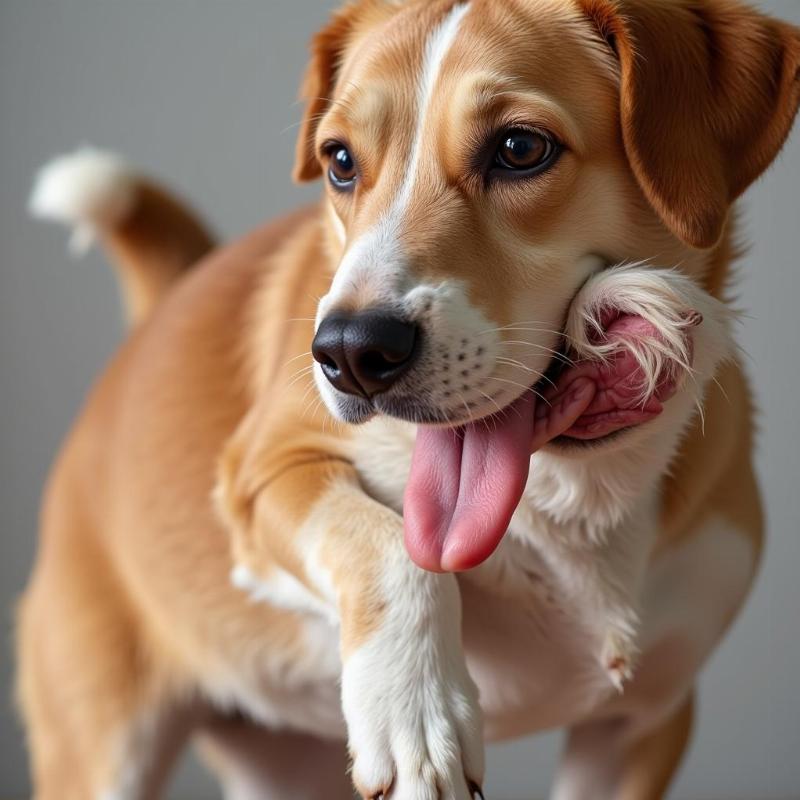If your dog is ripping hair off their tail, it can be a distressing sight for both of you. This behavior, often accompanied by excessive licking, chewing, or biting, can indicate underlying issues ranging from allergies to anxiety. Understanding the potential causes and available solutions is crucial for restoring your furry friend’s comfort and well-being.
Why is My Dog Ripping Hair Off Their Tail?
Several factors can contribute to this behavior. Allergies, especially to flea bites or environmental allergens, are a common culprit. Parasites like fleas, mites, and ticks can also cause intense itching, leading to self-trauma. Infections, both bacterial and fungal, can irritate the skin and prompt your dog to chew or lick excessively. Hormonal imbalances can affect skin and coat health, potentially triggering this behavior. Finally, psychological factors such as anxiety, boredom, or stress can manifest as compulsive grooming behaviors.
 Dog licking its tail
Dog licking its tail
Allergies and Parasites: Common Culprits
Fleas are a frequent offender, and even a single bite can cause significant discomfort for sensitive dogs. Other parasites like mites and ticks can also irritate the skin. Environmental allergies, like pollen or dust mites, can also trigger itching and inflammation. If you suspect allergies, consult your veterinarian for appropriate testing and treatment options. This may involve allergy testing, medication, or dietary changes. Regular flea and tick prevention is essential for all dogs, regardless of whether they have known allergies.
Infections: Bacterial and Fungal
Skin infections can also cause intense itching and discomfort, leading to hair loss on the tail. Bacterial infections often result in redness, swelling, and sometimes discharge. Fungal infections, like ringworm, can cause circular patches of hair loss and scaling. If you notice any signs of infection, it’s important to seek veterinary care promptly. Your veterinarian can diagnose the type of infection and prescribe appropriate medications, such as antibiotics or antifungals.
Hormonal Imbalances and Psychological Factors
Hormonal imbalances, such as hypothyroidism or Cushing’s disease, can affect skin and coat health, making dogs more prone to itching and hair loss. Psychological factors can also play a significant role. Anxiety, boredom, or stress can lead to compulsive grooming behaviors, including excessive licking and chewing of the tail. If your veterinarian has ruled out medical causes, consider environmental enrichment and behavioral modification techniques to address potential anxiety or boredom.
Treating the Underlying Cause
Successfully addressing tail chewing requires identifying and treating the root cause. This may involve:
- Flea and Tick Prevention: Use a veterinarian-recommended preventative year-round.
- Allergy Management: Identify and avoid allergens, and consider medications or immunotherapy.
- Medication: Antibiotics for bacterial infections, antifungals for fungal infections, or steroids for inflammation.
- Behavioral Modification: Address underlying anxiety or boredom through training, enrichment, and potentially medication.
- Dietary Changes: A hypoallergenic diet may be recommended for food allergies.
Conclusion: Restoring Your Dog’s Comfort
A dog ripping hair off their tail can be a sign of various underlying issues, from allergies and parasites to infections and psychological factors. By carefully observing your dog, consulting with your veterinarian, and addressing the root cause, you can help restore your furry friend’s comfort and well-being. Remember, early intervention is key to preventing further complications and ensuring a happy, healthy tail wag.
FAQs:
-
How can I tell if my dog’s tail chewing is due to allergies? Other signs of allergies can include itching, redness, sneezing, and ear infections.
-
What are the best flea and tick preventatives for dogs? Consult your veterinarian for recommendations tailored to your dog’s specific needs and lifestyle.
-
Can stress cause a dog to rip hair off their tail? Yes, stress and anxiety can lead to compulsive grooming behaviors.
-
What should I do if my dog has a skin infection? Seek veterinary care promptly for diagnosis and appropriate treatment.
-
How can I help my dog with anxiety-related tail chewing? Behavioral modification, environmental enrichment, and potentially medication can help manage anxiety.
Related Articles on Beautdogs.us:
- matching pyjamas for you and your dog
- thing 1 and 2 dog costumes
- dog sweaters with harness hole
- bird dogs that dont shed
Beautdogs.us is your premier online resource for comprehensive dog care information, breed-specific guidance, and a curated selection of products tailored to the needs of dog owners across the US. Whether you’re a seasoned pet parent or just starting your journey with a new furry companion, Beautdogs.us offers expert advice and valuable resources to help you navigate every aspect of dog ownership. Contact us today for personalized guidance on providing the best care for your canine companion. Email: [email protected], Phone: +1 501-555-7529. Connect with us at Beautdogs.us.